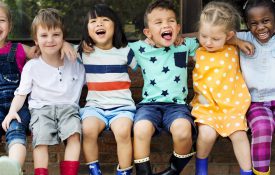-
25th Annual Canadian Society for Brain, Behaviour and Cognitive Science Meeting
Carleton University will host the 25th Annual Canadian Society for Brain, Behaviour and Cognitive Science Meeting (CSBBCS) from June 5 to 7, 2015. For more information, visit the conference website.
-
New Research From Psychological Science
Read about the latest research published in Psychological Science: It's All in the Family: Brain Asymmetry and Syntactic Processing of Word Class Chia-lin Lee and Kara D. Federmeier The specialization of the left hemisphere for language processing is considered to be one of the key examples of functional lateralization in the brain; however, studies now indicate that the right hemisphere may play a larger role in language than was once assumed. Electroencephalographic data were collected as right-handed participants judged the grammaticality of phrases presented in the left or right visual field.
-
Why People Buckle Up in Cars, But Not in Cabs
In May, Nobel Prize-winning economist John F. Nash Jr. and his wife Alicia were tragically killed in a car accident on the New Jersey expressway. Investigators reported that they were not wearing seat belts at the time, and died after being thrown from the backseat of their taxi. Whether you’re in the front or back of a car, wearing a seat belt is often the most effective way to prevent serious injury in case of an accident. Yet, in some situations -- such as riding in the back of a cab -- people are far less likely to buckle up. In New York City, taxi drivers and their passengers are exempt from laws regarding car seats and seat belts.
-
A ‘Learning’ Attitude Helps Boost Job Search Success
For most jobseekers, the job hunt is no picnic -- disappointment, rejection, and desperation seem to have become hallmarks of the typical job search. It’s common to hear stories of job hunters who have submitted hundreds of applications before getting a single interview. No one will argue that looking for a new job isn’t stressful, but new research finds that the way people manage and channel this stress could have a big impact on their ultimate success.
-

Kids’ Altruism Linked with Better Physiological Regulation, Less Family Wealth
Children as young as 4 years old may reap better health from altruistic giving, a behavior that tends to be less common among kids from high-income families.
-
Weakening Memories of Crime through Deliberate Suppression
There are some bad memories — whether of a crime or a painful life event — that we’d rather not recall. New research shows that people can successfully inhibit some incriminating memories, reducing the memories’ impact on automatic behaviors and resulting in brain activity similar to that seen in “innocent” participants. The research is published in Psychological Science, a journal of the Association for Psychological Science. “In real life, many individuals who take memory detection tests want to distort their results.

